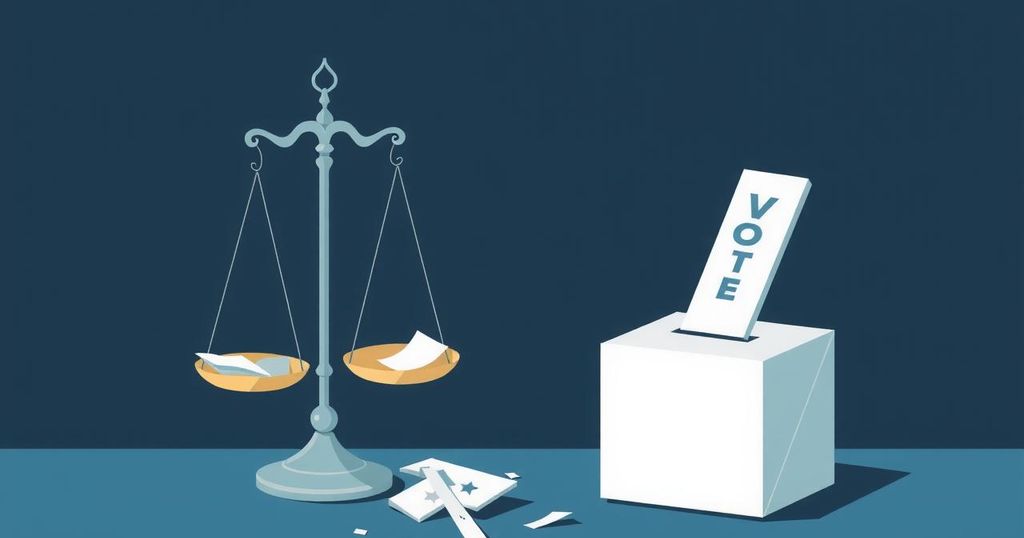Nigeria’s Compulsory Voting Bill Highlights Electoral Hypocrisy

Nigerians face a troubling paradox with the proposed Compulsory Voting Bill, which threatens jail time for non-voters while allowing electoral riggers to go free. Lawmakers seem disconnected from the challenges citizens face in a flawed electoral system, as trust in the process collapses. Instead of punitive measures, there is a pressing need for genuine democracy reform, which could reignite civic engagement without fear of retribution.
In recent discussions surrounding Nigeria’s proposed Compulsory Voting Bill, there’s a stark conflict between enforcing civic duty and addressing corruption. Citizens often hear the phrase, “Nigeria can happen to anybody,” which reflects a deeper concern about a system that seemingly punishes the apathetic while allowing corrupt politicians to run free and even thrive. It’s frustrating — how can voters be jailed for not participating when election rigging remains rampant?
Instead of putting efforts into legislation that would actually crack down on vote rigging, lawmakers are pushing for mandatory voting. This proposal, met with widespread criticism, might seem misplaced, especially when the trust in election integrity is waning. The disconnect between Nigeria’s political elite and the populace is growing, as it feels like lawmakers are more focused on how to enforce participation rather than ensuring a fair and transparent electoral process.
This situation underscores a troubling trend where laws can serve to reinforce power imbalances. If you look closely, it’s clear that the rich and powerful often escape accountability while the vulnerable are forced to comply via punitive measures. In this environment, the absurdity of punishing non-voters with incarceration becomes painfully apparent. Meanwhile, those who manipulate elections seem to operate without any fears of repercussions, sometimes even flaunting their accomplishments openly.
Voting, to be clear, is indeed a civic responsibility. It’s about shaping the nation’s destiny. However, the notion of forcing individuals to vote through threats like jail time feels more like an abuse of power than an invitation to participate. Posturing or bullying won’t make citizens more engaged. Trust is earned through fairness and transparency, not coercion.
In Nigeria, where elections are marred by violence, coercion, and outright fraud, penalizing those who have lost faith in the voting system feels unjust. Many voters face significant hurdles, including logistical issues at polling places or even violence, making it frustratingly clear that it’s not just non-voters who’re disenfranchised. How can lawmakers ensure a democratic process when the very act of trying to engage can be so risky?
Instead of victimizing disengaged voters, perhaps the government should focus on addressing the systemic flaws existing in the electoral landscape. Instead of employing forceful methods, the goal should be to cultivate a healthy democratic process. Sadly, lawmakers are leaning towards authoritarian tactics rather than participating in democratic principles.
And what about those who truly undermine democracy? The election riggers — individuals who orchestrate vote buying and intimidation — continue to roam free, while ordinary citizens might face jail time for merely not participating. These election riggers perpetrate widespread electoral abuses, but the ones truly suffering are those too disillusioned to take part in a process that seems rigged against them.
We’ve seen all too often reports of electoral manipulation during general elections. Complaints about intimidation have been widespread. Yet actual accountability for those involved in these heinous acts is almost nonexistent. If the government expects citizens to remain actively involved in elections, it must first create an environment where participation is safe and meaningful.
It’s strikingly hypocritical for politicians who are part of the system of corruption to now demand increased civic responsibility from citizens. You can’t destroy faith in democracy and then impose penalties on those who have lost belief in a rigged system. This is a glaring discrepancy that reflects the larger decay in Nigeria’s political and justice systems.
Eventually, the issue boils down to one of justice, or the lack thereof. Nigeria has fostered a system where accountability is seemingly absent, while its citizens face the consequences. Democracy should empower citizens, not treat them as criminals for their disillusionment.
So, the message is clear. For genuine voter engagement, the solution doesn’t lie in threats but rather in reforming the electoral system to ensure that it’s fair and credible. Citizens need to see the value of their votes; they need real assurances that corrupt practices will be addressed. Until changes are made, punitive steps against non-voters won’t boost involvement; it will only deepen the disillusionment.
If Nigeria is to avoid further entrenching these inequities, there’ll need to be a serious reassessment of how the legal system treats its citizens. Until then, the irony remains that punishing those who opt out of a frail system might serve only to highlight its failings.
In summary, Nigeria’s proposed Compulsory Voting Bill raises significant concerns about punishing citizens instead of confronting electoral rigging. The disconnect between lawmakers and the populace must be addressed through genuine reform focused on improving the electoral process, rather than enforcing participation through threats. Real democracy cannot thrive when the system appears stacked against the very citizens who are meant to uphold it. Without meaningful change, the nation runs the risk of deepening public disillusionment, ultimately making civic engagement even more difficult.
Original Source: thesouthernexaminer.com







